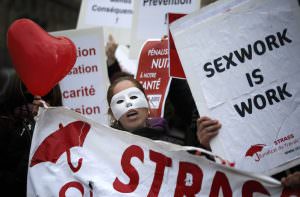Andrea Dworkin: Teller of Hard Truths
A new book offers an opportunity to revisit the writer's maligned but searing insights into the impact of pornography on women. Andrea Dworkin speaks in 1986 at a federal commission on pornography in New York City. (Richard Drew / AP)
Andrea Dworkin speaks in 1986 at a federal commission on pornography in New York City. (Richard Drew / AP)
When Andrea Dworkin was alive, she despaired that her work would never be given its due. Writing was Dworkin’s life, and she once said, “To communicate and to survive, as a writer and as a woman: the two are one for me.” The publication of a new collection of many of Dworkin’s well-known works of both theory and fiction, “Last Days at Hot Slit,” has, simply by virtue of its publication, stimulated a reassessment of Dworkin’s work by taking her writings seriously—a far cry from the way her books were treated when they were originally published.
Along with a timely introduction to Dworkin’s writing, the book contains excerpts from “Woman Hating” (her first book, published in 1974), her epic analysis, “Pornography: Men Possessing Women,” and her soul-wrenching novel, “Mercy.” Other selections are letters Dworkin wrote to her parents and an unpublished essay called “Goodbye to All This,” a biting retort to the “proud, pro-sex, liberated” women who, in her words, fought “for the right to be humiliated … for the right to be tied up and proud, for the right to be hurt.” “Last Days at Hot Slit” ends with “My Suicide,” a previously unpublished essay written before Dworkin’s death in 2005 from myocarditis, an inflammation of the heart.
When we interviewed women about the impact Dworkin’s writing had on their lives and work, Australian novelist, poet and feminist book publisher Sue Hawthorne singled out Dworkin’s fiction:
I recall the visceral response I had to her short story “Slit” and to her book, “Ice and Fire.” But the greatest effect on me was reading “Mercy” … which has the most extraordinary detail about how it feels as a girl and a woman to be sexually violated for a significant part of her life. It is intense and difficult to read. But many significant works of literature are difficult to read. If she were a man, I’m pretty sure “Mercy” would be accorded the same status as James Joyce’s “Ulysses.”
Reading “Mercy” inspired Hawthorne to write her own novel, “Dark Matters,” about the erasure of lesbians and violence against lesbians, “a book I had to write as an action and in the hope that through fiction I might be able to change the world. At the very least, I should attempt to do so.”
In reading the various reviews and media features that have accompanied this Andrea Dworkin revival, we are struck by how even writers who pen favorable words about her work seem compelled to mention her appearance. The initial sentences of the editor’s preface to “Last Days” highlight Dworkin’s “uniform of denim overalls and sneakers.” Whereas Dworkin’s opponents used her “uniform” to discredit her work and her words, the editors view her legacy more positively. However, an allusion to her attire in an otherwise approving introduction comes across as unwarranted.
Co-editor Johanna Fateman lists in the preface some of the caricatures of Dworkin’s works, yet she doesn’t refute or dispel them. Dworkin, for example, is said to have introduced “a vision of sex that would repel many … a sharply constrained and prescriptive menu of behavior.” Yet many others understand that Dworkin’s “vision of sex,” so powerfully wrought, exposes the granite of women’s suffering. It invites readers to question what sex is in a culture where gonzo pornography and the transformation of prostitution into ordinary work have ruined women’s lives.
Gena Corea, author of the “The Mother Machine: Reproductive Technologies from Artificial Insemination to Artificial Wombs,” told us that the clarity of “Pornography” prompted “one of Andrea’s insights that will not quit me: When men experience the extreme pleasure of orgasm at the sight of women degraded and less-than-human, the inequality of women is something learned in the very cells of their bodies … Pornographic propaganda against women infiltrates the body, waves of pleasure teaching that women are sub-human,” thereby building “the emotional structure” for the inequality of women. In recent years, Corea has worked with a group of male prisoners who have committed violence against women and underscores the significance of “Pornography” in exploring their crimes.
Commenting on Dworkin’s testimony before the 1986 Meese Commission on Pornography, Fateman states in the preface to “Last Days” that Dworkin’s “image would never recover from this strategic alignment with anti-obscenity conservatism.” This is a curious statement. Has Malcolm X’s alignment with the Nation of Islam damaged his image in perpetuity? When the American Civil Liberties Union joined with evangelicals to pass the Prison Rape Elimination Act, did the organization’s collaboration do permanent damage to its image? Rather than “never recover[ing] from this strategic alignment with anti-obscenity conservatism,” Dworkin’s “image,” for many women, was enhanced by her courageous testimony in a government forum that otherwise would never have heard a radical feminist analysis of pornography. Dworkin understood the boundaries of engagement—that a commission appearance is not an alliance and that individuals and groups that strive to advance political change search for ways to act across differences in ideology and tactics.
In a preface to her essay, “Pornography Is a Civil Rights Issue,” included in “Letters from the War Zone,” Dworkin responded to these criticisms of collusion with conservatives:
I testified … [because] pro-pornography “feminists” had already testified in other cities. I spoke to the Commission because my friends, feminists who work against pornography, asked me to. … A campaign costing nearly one million dollars would effectively discredit the findings of the Commission by smearing those who oppose pornography, creating a hysteria over censorship, and planting news stories to say that there is no proven relationship between pornography and harm to women and children. … Representatives of Penthouse sat with the ACLU lawyers and so-called feminists organized to defend pornography; and they heckled me during this testimony.
What is missing in “Last Days,” an otherwise laudable testimony to Dworkin’s greatness as a feminist thinker, writer and activist, is a perspective on her political theory and its import. The editors—mainly Fateman—acknowledge Dworkin’s influence. The preface recognizes that Dworkin “helped shape the historic grassroots feminist organizing of the late 70s and 80s; she rallied the forces of the antipornography, antirape and battered women’s movements.” However, there is uneasiness with her uncompromising writing even as it is portrayed as “empty of caveats, equivocation, or the endless positing of one’s subjective limits.” Dworkin understood, as British abolitionist Elizabeth Heyrick wrote, that “truth and justice make their best way in the world when they appear in bold and simple majesty.”
Two generations after Dworkin’s first book was published, New Zealand writer Renee Gerlich comments insightfully on Dworkin’s “uncompromising writing”:
Uncompromising refusal is a definitive feature of her work, refusal that stands in direct opposition to the accommodation expected of women. For this, Andrea was monsterized. The smearing of Andrea’s work also acts as a lesson to women including myself. Whatever bravery it took Andrea to confront and reject men’s abuse of women, and however patient, considered and gracious her writing and speaking reveal her to have been, Andrea’s name is associated with an ugly volatility. Her detractors made an example of her, so that other women would not want to do what she did—namely reclaim our own creative energy and love for one another, our clarity of perception and moral instinct, and our ability to speak truthfully and powerfully from the gut. Of course, women can’t be stopped from wanting these freedoms—and Andrea’s work stirs us to claim them and sustains us in this effort.
In the 1980s, Dworkin and Catharine MacKinnon, along with a dedicated band of radical feminist activists, launched a courageous and groundbreaking civil rights ordinance against pornography. Dworkin, in one of our favorite passages, wrote:
The creative mind is intelligence in action in the world. … The world is anywhere that thought has consequences. … Creative intelligence is searching intelligence: it demands to know the world, demands its right to consequence. … Women are not supposed to have creative intelligence, but when they do they are supposed to renounce it. If they want the love of men, without which they are not really women, they had better not hold on to an intelligence that searches and that is action in the world; thought that has consequences is inimical to fettered femininity.
This insistence on consequence, this attempt to make things real for women, is what Dworkin was most reviled for. She dared to think that she could transform her insights and intelligence into legislation that could help provide some legal means of redress to women who had suffered from pornographic violence. When FACT, the so-called Feminist Anti-Censorship Task Force, attacked the anti-pornography legislation that was supported by many women’s groups, neighborhood organizations, women in prostitution, survivors of sexual exploitation, lesbians, ethnic and civil rights organizations, and by the hundreds of women who risked public exposure and harassment testifying on behalf of this legislation, the personal and political attacks on Dworkin escalated.
When violence against women can be rationalized or, more to the point, marketed and valorized as “sex,” common agreement falters. Prostitution and pornography are the not-so-popular issues of violence against women, continually depoliticized and reduced to private choices. The endorsing of pornography and prostitution, especially from progressives and champions of women’s human rights—those who should be radical feminist allies, those who should have been Dworkin’s allies—is inexcusable.
When a woman works against pornography and prostitution, her reputation is destroyed, like the women who are exploited in prostitution and pornography. The latter are branded as sluts, whores, hookers, hoes and tarts, while the former are cast as uptight, anti-sex, extremist, fundamentalist, right-wing, conservative, moralistic, anti-feminist, and against a woman’s right to use her body in a self-determined way. If she is a writer, she gets censored from many publications that would be a natural outlet for her work. Rather than they, it is she who is portrayed as censorious and an opponent of free and progressive speech. In contrast, the pornographers and pimps are garlanded as human rights heroes and defenders of free speech.
Over the last several decades, it is Dworkin’s work that has been most influential in bringing pornography and prostitution “out of the closet” of the private sexual realm and into the public forum of male violence against women. From our own work against the global sex industry, we know that there are many who argue that prostitution and pornography can be “made better” for women. These advocates promote a “sustainable prostitution and pornography,” in which women are rendered “safer” for men’s use—in reality, no safety for women at all.
Dworkin knew that there is an urgent need for courage and for the political will to act against the global sexual exploitation of women and children. She possessed that courage and political will. She was among the first to name all practices of sexual exploitation for what they are. Not sex work, but sexual violence. Not human rights, but a human rights violation. Not the product of women’s consent, but the result of women’s compliance with the only options available.
In both the written and spoken word, Dworkin coupled sexual and economic degradation of women with a country’s national and foreign policy. In her 1983 speech to a conference of 500 men that is included in “Last Days,” she underscored the gendered war waged against women and our perpetual wars conducted abroad.
Rape and war are not so different. … [Y]ou’re turned into little soldier boys from the day you are born and everything you learn about how to avoid the humanity of women becomes part of the militarism of the country in which you live and the world in which you live. … Equality is a practice … an action … a way of life. It is a social practice. It is an economic practice. … It is a sexual practice. … It is a political necessity to create equality in institutions. … It cannot coexist with rape … or with pornography … or with prostitution or with economic degradation of women on any level.
Decades since her speech, a team of researchers created the largest global database on the status of women, WomanStats, and compared the security and level of conflict within 175 countries to the overall security of women in those countries. Their findings are profoundly instructive for global security and world peace. Democracies with higher levels of violence against women—including pornography, rape and prostitution—are less stable and are more likely to choose force rather than diplomacy to resolve conflict. Their empirical findings simply corroborate the luminous political insights that course through Dworkin’s work.
Dworkin was a teller of truth, a thinker, a writer, an activist and a generous human being. She gave many women the confidence of their convictions that sexual violence is not natural and normal and that in the chronicle of human atrocities, pornography is not trivial or incidental but a gigantic industry— a rotten enterprise—built on male power in which “the degradation of the female is the means of achieving this power.”
May this new collection of Dworkin’s writings, “Last Days at Hot Slit”—a panoply of Dworkin’s hard truths—lead many to reading her complete works.
Your support matters…Independent journalism is under threat and overshadowed by heavily funded mainstream media.
You can help level the playing field. Become a member.
Your tax-deductible contribution keeps us digging beneath the headlines to give you thought-provoking, investigative reporting and analysis that unearths what's really happening- without compromise.
Give today to support our courageous, independent journalists.




You need to be a supporter to comment.
There are currently no responses to this article.
Be the first to respond.